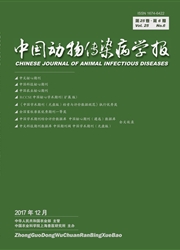

 中文摘要:
中文摘要:
雏鸡是鸡传染性贫血病毒(Chickenanemiavirus,CAV)的最易感宿主。为系统了解中国国内CAV海安分离株(HA9805)感染雏鸡后的病原动态及与血清学和致病性的关系,本研究对1日龄SPF鸡进行了人工感染实验,感染后不同时间进行样品采集,并用病毒学、血清学以及组织病理学方法进行了检测与分析。研究结果发现,CAV海安分离株(HA9805)通过胸肌接种可引发雏鸡CAV病毒血症,引起CAV特征性临床症状及病理变化,并导致雏鸡高达13.3%的死亡率;血清中CAV核酸以及中和抗体的产生与组织病理变化以及疾病进程密切相关。该结果为CAV的早期诊断,制定有效的预防与控制措施提供了科学依据。
 英文摘要:
英文摘要:
Chickens are susceptible to Chicken anemia virus (CAV). However, little is known for the pathogenesis of CAV infection in chickens. In this study, one-day-old chicks were intramuscularly injected with CAV Haian isolate(HA9805). The infected chicks developed viremia, clinical signs and histopathology and showed 13.3% mortality. Moreover, the presence of CAV genome as detected in PCR and neutralizing antibodies in serum samples were closely related to the disease development post infection. These findings would provide useful information for early diagnostics and control of CAV infection.
 同期刊论文项目
同期刊论文项目
 同项目期刊论文
同项目期刊论文
 期刊信息
期刊信息
